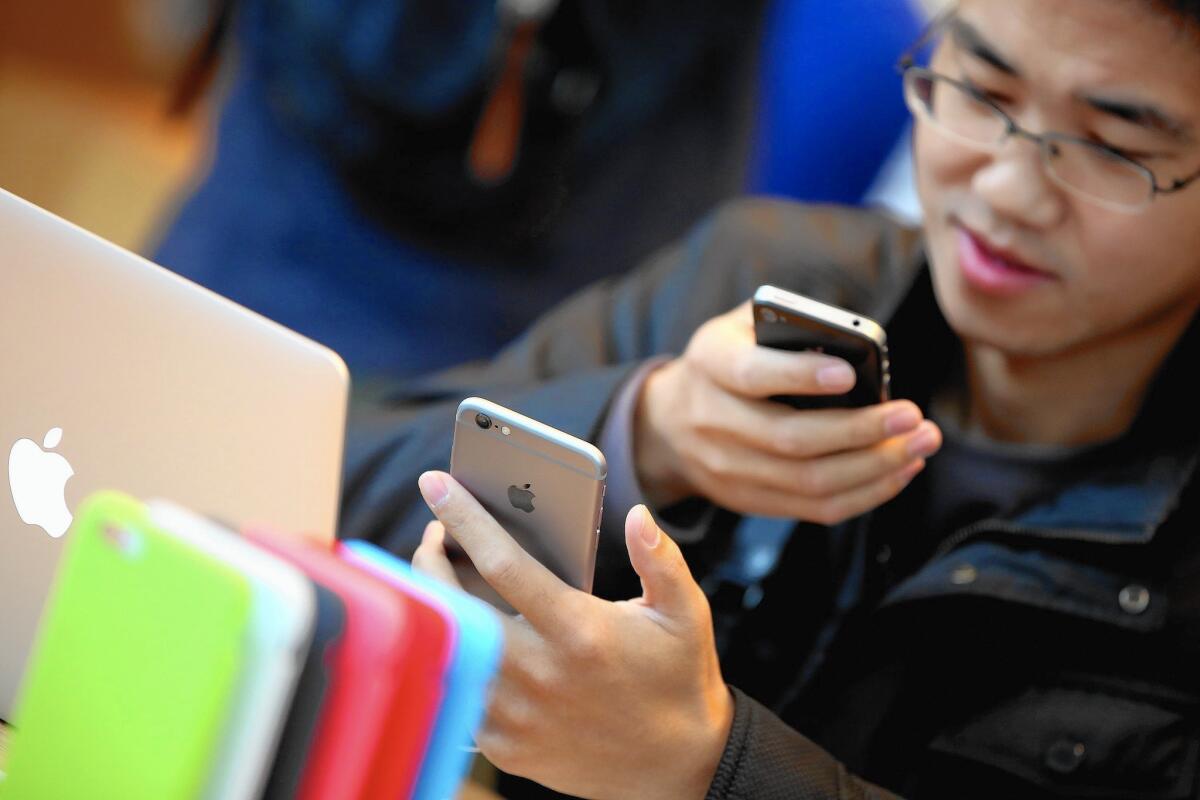Apple’s iBooks, iTunes Movies mysteriously suspended in China; customers want refunds

A man sets up his new iPhone 6 inside an Apple store in Beijing on Oct. 17, 2014.
- Share via
Reporting from Beijing — Chinese customers of Apple’s iTunes Movies and iBooks services are seeking refunds on their purchases amid reports that the features have been suspended at the behest of government authorities.
Apple has not issued any statement to customers in China about the status of the services, but many users report that they have been unable to connect to the movie service and iBooks since April 15.
A Beijing-based Apple spokeswoman said: “We hope to make books and movies available again to our customers in China as soon as possible,” but she would not elaborate on why the services were unavailable.
The Chinese government has not issued any statement on the matter. However, the New York Times, citing two anonymous sources, said the State Administration of Press, Publication, Radio, Film and Television had ordered the services offline, though it was unclear why.
Apple’s App Store revenue has surged in China in the last year, overtaking Japan as the world’s No. 2 market for the service, according to App Annie.
Apple technical assistance and account service representatives, reached by phone in China, said they had received no official notice from the company that the services had been blocked or shut down. They offered to arrange refunds on purchased content.
“The iTunes Store’s movie service is turned off,” one customer wrote on the Twitter-like service Sina Weibo. “I spent 88 kuai [about $13.50] buying a ‘Star Wars’ collection and have not had time to download it. I want know if I can get a refund or not.”
China has become a massive market for Apple since the Cupertino, Calif. company launched the iPhone on the mainland in 2009. In its fiscal year ending in September 2015, the company said total net sales increased 84% year-over-year in Greater China to $58.7 billion. (Greater China includes mainland China, Hong Kong and Taiwan).
Apple is one of only a handful of U.S. tech companies that have flourished in China.
Facebook and Twitter have been blocked by Internet censors for years. Google pulled its servers out of China in 2010 because of censorship. And Amazon has struggled to gain traction in the country against local rivals such as Alibaba.
The government in Beijing has moved to rein in foreign technology companies — at times demanding to add backdoors to hardware and urging data be stored on local servers. Apple said it has never provided a backdoor to Chinese authorities, but it agreed to store user data locally.
Now that millions of Chinese own Apple hardware, the company has set its sights on selling them content and services. On Sept. 30, Apple launched its music service, as well as iTunes Movies and iBooks in China. The company in February introduced Apple Pay in China as well.
The iTunes movie service enabled fans to rent or purchase movies from Chinese studios as well as Hollywood blockbusters. A variety of free and paid books also were made available on iBooks. Rentals of high-definition movies on iTunes started at about 77 cents, and purchases at $2.77. Paid iBooks started at about 8 cents.
“For the first time, customers in China will have access to Apple’s entertainment ecosystem with music, movies and books right at their fingertips,” the company said in a statement announcing the September launch.
Eddy Cue, Apple’s senior vice president of Internet Software and Services, added at the time: “Customers in China love the App Store and have made it our largest market in the world for app downloads. One of the top requests has been more great content, and we’re thrilled to bring music, movies and books to China, curated by a local team of experts.”
To encourage Chinese customers to start using iTunes Movies, Apple offered free rentals of the hit Chinese film “The Taking of Tiger Mountain” for a limited time. On the books front, Apple touted its selection of Chinese books and foreign novels, noting that it was bringing Stephenie Meyer’s “Twilight” series to China for the first time in a digital format.
Apple Chief Executive Tim Cook took to Weibo on the day of the launch, telling Chinese customers: “Excited to launch Apple Music, iTunes Movies and iBooks in time for you to enjoy over the October holidays!” China celebrates its National Day on Oct. 1.
So far, Cook’s Weibo account has been silent about the services’ suspension.
Yingzhi Yang in The Times’ Beijing bureau and David Pierson in Los Angeles contributed to this report.
More to Read
Sign up for Essential California
The most important California stories and recommendations in your inbox every morning.
You may occasionally receive promotional content from the Los Angeles Times.









